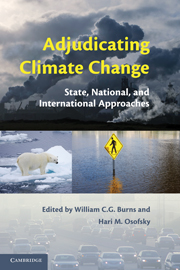Book contents
- Frontmatter
- Contents
- Foreword
- Acknowledgments
- Adjudicating Climate Change
- 1 Overview: The Exigencies That Drive Potential Causes of Action for Climate Change
- PART I SUBNATIONAL CASE STUDIES
- 2 State Action as Political Voice in Climate Change Policy: A Case Study of the Minnesota Environmental Cost Valuation Regulation
- 3 Litigating Climate Change at the Coal Mine
- 4 Cities, Land Use, and the Global Commons: Genesis and the Urban Politics of Climate Change
- 5 Atmospheric Trust Litigation
- PART II NATIONAL CASE STUDIES
- PART III SUPRANATIONAL CASE STUDIES
- 17 Conclusion: Adjudicating Climate Change across Scales
- Index
- References
5 - Atmospheric Trust Litigation
Published online by Cambridge University Press: 25 August 2009
- Frontmatter
- Contents
- Foreword
- Acknowledgments
- Adjudicating Climate Change
- 1 Overview: The Exigencies That Drive Potential Causes of Action for Climate Change
- PART I SUBNATIONAL CASE STUDIES
- 2 State Action as Political Voice in Climate Change Policy: A Case Study of the Minnesota Environmental Cost Valuation Regulation
- 3 Litigating Climate Change at the Coal Mine
- 4 Cities, Land Use, and the Global Commons: Genesis and the Urban Politics of Climate Change
- 5 Atmospheric Trust Litigation
- PART II NATIONAL CASE STUDIES
- PART III SUPRANATIONAL CASE STUDIES
- 17 Conclusion: Adjudicating Climate Change across Scales
- Index
- References
Summary
INTRODUCTION
This chapter outlines the contours of potential “atmospheric trust litigation,” designed to provide a means by which courts can hold governments at the national and subnational level accountable for reducing carbon emissions. Such litigation rests on the premise that all governments hold natural resources in trust for their citizens and bear the fiduciary obligation to protect such resources for future generations. The trust is embedded in the law as an attribute of sovereignty itself. While most frequently applied to state governments, public trust theory applies with equal force to the federal government, and seemingly indeed, to any sovereign. Atmospheric trust litigation would characterize the atmosphere as one of the assets in the trust, shared as property among all nations of the world as co-tenants.
Protection of the trust through judicial oversight lies at the heart of the public trust jurisprudence in this country. As this chapter explains, the courts have the ability to enforce a fiduciary obligation to reduce carbon at all levels of government. Whether they will do so or not depends largely on individual judges' perception of the urgency of climate crisis, their belief as to whether the political system will address the issue, and their view of the role of the judiciary in confronting climate change. While atmospheric trust litigation bears the risk of any untested strategy, it is perhaps the only macro approach that can empower courts to effectuate the reductions in emissions within the limited time frame afforded to us before critical climate thresholds are exceeded.
- Type
- Chapter
- Information
- Adjudicating Climate ChangeState, National, and International Approaches, pp. 99 - 126Publisher: Cambridge University PressPrint publication year: 2009
References
- 2
- Cited by



